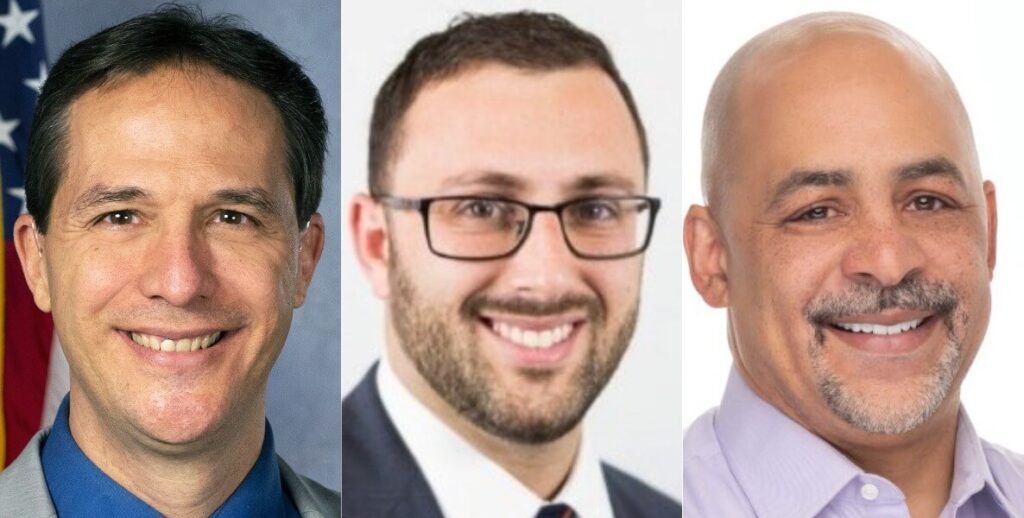In the end, all of City Council—save one member—voted to confirm Seth Bluestein last week to fill out the elected city commissioner term of fellow Republican Al Schmidt, who left to head the watchdog group Committee of Seventy. You may have missed this news, and who could blame you? At first blush, it’s another anodyne story about nothing more than the backstage machinery of local governance, right?
Well, bear with me. Because everything leading up to, and in the aftermath of, Bluestein’s appointment actually tells us a lot about the degree to which ideological purity has stained our politics, and raises serious questions about just what passes for political courage these days. Let’s run through it.
Adding credibility to Philly’s election apparatus
The Home Rule Charter calls for one of the three commissioner positions to be held by a minority party; in this city, with its nearly 8 to 1 Democrat to Republican registration ratio, that has effectively meant a Republican. I’ve long been a critic of having an elected office that is charged with running elections, but in 2020, I was proven wrong.
When Republican Al Schmidt (and his deputy, Bluestein) defied Trump and his henchmen and declared the election free and fair, it was a big deal. Having Republicans like Schmidt, Bluestein, Atlanta Secretary of State Brad Raffensperger and other GOP electeds in Michigan and Arizona publicly attest to the fact of election integrity significantly lessened the believability of Trump’s magical thinking, and lent credibility to Philly’s election apparatus.
That’s an argument that’s lost on Councilwoman Kendra Brooks, who voted “no” on confirming Bluestein and, like other Democratic Socialists, wanted to see a representative from the Working Families Party capture what had been a Republican seat. “We don’t need to continue giving power to a party chipping away at our democracy,” she said, conveniently ignoring the fact that Bluestein had quite precisely stood for strengthening our democracy.

It’s a sign of the times. After Trump, we had the opportunity to return to rational communitarianism, a Madisonian philosophy of governing that values rights and responsibilities, and the hard work of problem-solving over reflexively fighting to the death. Unfortunately, in addition to turning much of the Republican party into a mix of appeasers and apologists for sedition, Trumpism has spawned a purity test on the left that not only defies logic—it often hands ammunition to or otherwise aids and abets its professed enemy.
You see it on the national stage, where a groundbreaking $500 billion environmental bill deal was there to be had with Senator Joe Manchin as an alternative to the gargantuan Build Back Better proposal, but progressives opted to vilify Manchin instead —this week, Paul Krugman referred to the “Manchin administration” in the White House—and fantasized about challenging the West Virginia senator in a primary, thereby basically guaranteeing turning his senate seat from blue to red. So: Turning your back on making real inroads against climate change..that’s progressivism?
Where it really gets interesting—and maybe a tad bit hopeful
The same type of politically naive rigidity can be found locally. After Kenney nominated Bluestein, (who, like Schmidt, was the target of death threats from wacko conspiracy theorists for standing for election integrity), a consortium of progressive groups—Reclaim Philadelphia, the 215 People’s Alliance, Make the Road PA, and the Philadelphia chapter of Democratic Socialists of America—were joined by five left wing state representatives in signing a letter that called for Council to reject the mayor’s nomination of Bluestein to fill out Schmidt’s term. Those reps were Chris Rabb, Joe Hohenstein, Elizabeth Fiedler, Nikil Saval and Rick Krajewski.
This is where it really gets interesting, and maybe a tad bit hopeful. In short order, two of those progressives reversed their opposition to Bluestein: Rabb and Hohenstein. Rabb tweeted that he had put “process over people, and that was wrong.” I reached out to him, but he didn’t return my call, conjuring memories of all those finger-to-the-wind Republicans in congress who know Trump’s a fraud but who shiver in fear of angering their party’s rabid base.
That Rabb took the risk of breaking from his comrades over Bluestein is actually a sign that political courage, though on life support, still gasps for breath in 2022.
But let’s give credit where it’s due: Thanks to redistricting, Rabb—never a favorite of his party’s machine—will be squaring off against a fellow progressive incumbent in his newly drawn district. That he took the risk of breaking from his comrades over Bluestein is actually a sign that political courage, though on life support, still gasps for breath in 2022.
Arguably, Hohenstein had even more to lose than Rabb. Even before the redistricting map, he was facing a challenge from his left, and Reclaim Philadelphia still has its sights set on him, despite the fact that the group had previously endorsed him twice.
And this is what makes that so scary: By any measure, Hohenstein is a card-carrying progressive. Apparently, he just wasn’t pure enough for Reclaim, which, among its many outlandish policy goals, advocates for abolishing police and prisons.
“For example, Hohenstein has co-sponsored bills—and even authored one, HB338—that create new mandatory minimum prison sentencing law, clearly demonstrating that he views keeping people in cages as a solution to community harm…” Reclaim asserts in its steering committee’s recommendation to oppose Hohenstein. “During the uprisings last year, he put out statements condemning both sides and giving legitimacy to white supremacists. He’s aligned himself against the candidates our membership has chosen to support; he endorsed Larry Farnese over Nikil Saval in 2020, and failed to support Larry Krasner for re-election.”
RELATED: Real problem-solving is more popular than both the Woke and MAGA crowds would have you believe.
When you look at Hohenstein’s record, though, you see a loyal progressive. The bill that so outraged Reclaim? Here’s its description:
An Act amending Title 18 (Crimes and Offenses) of the Pennsylvania Consolidated Statutes, in falsification and intimidation, further providing for the offense of unsworn falsification to authorities; and, in firearms and other dangerous articles, further providing for persons not to possess, use, manufacture, control, sell or transfer firearms, for licenses and for sale or transfer of firearms.
A lot of gobbledygook, I know, but let’s review: It was put forth by Democrats, it went nowhere, and, in substance, it hardly seems like a threat to the progressive world order, huh? No, Hohenstein’s real sin was political—his lack of support for Saval and Krasner. It is always thus in True Believer Land (See: Union, Soviet). Freedom of thought is a luxury; you deviate from the party line at your peril.
He had the temerity to think for himself
When I caught up with Hohenstein earlier this week, he seemed a bit stunned that his old allies had turned on him.
“Yes, I’ve felt that what was happening to me was a type of purity test,” Hohenstein said. “Part of what we need to keep in mind is that no single person or entity out there has the entire truth. We have to be flexible in pursuit of the full truth. In this case, I took an action without thinking everything through, without checking with all those involved—folks in the Commissioners’ Office and in Council—as to what kind of person Seth Bluestein is. I want to be clear—the letter my colleagues sent was well-intentioned, because, let’s face it, the Republican party in Pennsylvania as well as the nation is not your grandfather’s Republican party. But when I learned more I had to make the decision I would have made had I known more to begin with. To me, it’s just about doing the right thing.”
“Yes, I’ve felt that what was happening to me was a type of purity test,” Hohenstein said. “Part of what we need to keep in mind is that no single person or entity out there has the entire truth. We have to be flexible in pursuit of the full truth.”
After our call, I kept ruminating about the situation Hohenstein finds himself in, and I couldn’t quite put my finger on what feels so unique here…until it came to me. The dude changed his mind and is being challenged by his former allies because he had the temerity to think for himself in a couple of instances.
Changing your mind and defying your friends is a radical act in politics these days, which more and more has taken on the trappings of religion: Blind faith, an instinct to shun or punish nonbelievers, a surety that borders on arrogance, a lack of doubt. (John McWhorter makes this case brilliantly in his new book, Woke Racism.)
RELATED: Everything you need to know to get ready to vote in the 2022 primary
The older I get, the more wisdom I find in the observation by the late legendary screenwriter, William Goldman: “Nobody knows anything,” he wrote in Adventures in the Screen Trade. “Not one person in the entire motion picture field knows for a certainty what’s going to work. Every time out it’s a guess and, if you’re lucky, an educated one.”
So it is in politics. Those we should side-eye are the ones who profess to have all the answers, and who, cult-like, demand fealty from their flock. “He knows nothing; and he thinks he knows everything,” wrote George Bernard Shaw. “That points clearly to a political career.”
Count me with them
Think about it. The politicians who history records as having made a difference are often the ones willing to confront tried and true shibboleths—from FDR (“It is common sense to take a method and try it; If it fails admit it frankly and try another”) to Jack Kemp to Bobby Kennedy. Count me with them, leaders who have been willing to defy their constituencies and think things anew. (During his stirring 1968 presidential campaign, RFK was speaking to an anti-war collegiate audience—his base. “Who’s going to pay for all your social programs?” one student asked. “You are,” Kennedy coolly replied, explaining that, in the Kennedy family code, “to whom much is given, much is required.”)
Leaders who stand for pragmatic change rather than ideological rigidity represent a tension as old as our history: the conflict between group think and progress. There’s that word again, progress. True progressives, like FDR, think freely and challenge convention.
Yes, creative problem-solvers are in short supply these days, but there is nothing actually new in that. “In the present case it is a little inaccurate to say I hate everything,” wrote H.L. Mencken some 80 years ago. “I am strongly in favor of common sense, common honesty and common decency. This makes me forever ineligible to any public office of trust or profit in the Republic.”
Well, there’s comfort to be taken in the fact that Mencken would see the intellectual tyranny being wrought by Philly socialists and MAGA nincompoops today and recognize it as something corrosive…that has still failed to topple the Republic.
RELATED

